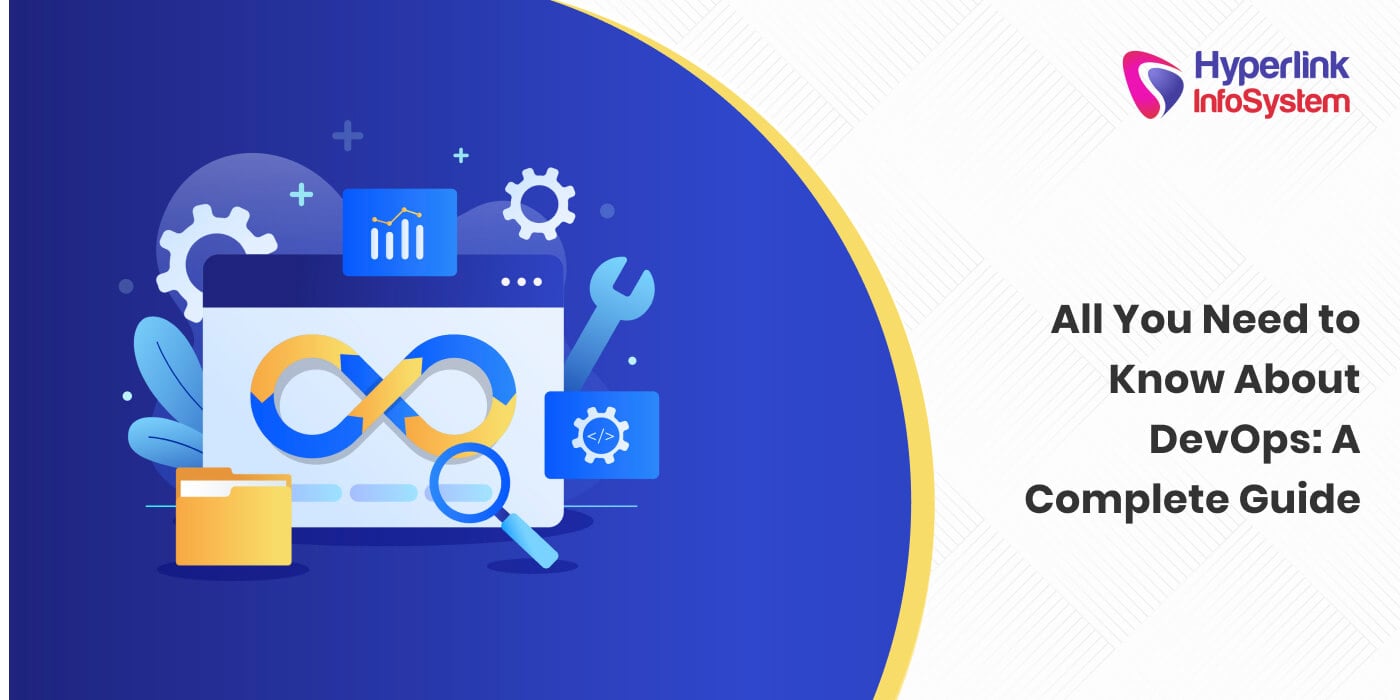In the software world, DevOps is synonymous with speed, quality, and efficiency. The right DevOps tools and strategies allow businesses to build and deploy high-quality software and bring them to the market quickly and efficiently. By improving communication and collaboration between different teams, DevOps facilitates better transparency, visibility, and responsibility. This guide offers detailed insight into the world of DevOps: from benefits and use cases to key components and tools.
What Is DevOps?
DevOps is a set of tools, practices, and philosophies to improve software development speed and quality. DevOps fuels cross-department communication and teamwork by bringing the development and operations teams together. Such collaboration plays a huge role in increasing an organization’s ability to deliver applications and services at high velocity. Using
DevOps tools, software development teams can evolve and improve their products and better serve the needs of customers.
What Is The History Of DevOps?
Software development teams are always seeking to improve the efficiency of their efforts across the software development lifecycle. When the limitations of the waterfall method became evident, the DevOps movement came into the picture. Teams began to realize that poor inter-departmental communication impacted the quality and timeliness of their software projects.
The
concept of DevOps emerged to overcome the problem of siloed teams. It was introduced to unify the goals and objectives of different teams and overcome the problem of long hours, botched releases, and unhappy customers. By empowering different teams to work together to deliver on common goals, today DevOps helps teams overcome many of the traditional challenges of software development.
Why Is DevOps Important?
The software development landscape is extremely complex and competitive. To stand out and meet the fluctuating needs of customers, software development teams must ensure faster and more efficient development. As an amalgamation of development (Dev) and operations (Ops) teams, a DevOps consulting company can help in:
-
Creating stronger bonds between Dev, Ops, and other stakeholders in the company.
-
Improving speed and stability of software products and ensuring continuous delivery of new features and updates.
-
Promoting shorter, more controllable iterations and ensuring the software addresses business and user requirements.
-
Fostering a culture of shared responsibility and accountability between different software development teams.
-
Enhancing the level of trust and transparency across the CI/CD pipeline while reducing human errors and shortening feedback loops.
What Problems Does DevOps Help To Solve?
Starting From delays in delivery to risky deployment, software quality issues to regulatory compliance challenges; DevOps helps solve several challenges for businesses. Let’s look at how DevOps consulting companies resolve the many hurdles that software development teams face daily:
For Development Teams, a DevOps service provider can help overcome issues with software development and deployment. Through the implementation of the right processes and frameworks, a DevOps consulting company can improve development efficiency and product quality.
For Operations Teams, DevOps consulting services can help deal with operational stability challenges. Through frequent automation, they can ensure efficient and streamlined delivery. They can establish a continuous improvement process and enable efficient day-to-day operations.
What Are The Benefits Of DevOps?
DevOps offers a diverse range of benefits to every member working across the software development lifecycle.
1) Better Communication
The biggest benefit of DevOps is improved communication. A DevOps consulting company can help bridge departmental silos and bring all stakeholders together. Through the implementation of a unified tool, a DevOps development company can improve project visibility and ensure everyone is on the same page.
2) Improved Productivity
DevOps plays a huge role in improving the productivity and efficiency of software development teams. Automated tools help speed up delivery while reducing manual efforts and errors.
3) Code Consistency
In a highly volatile business environment, DevOps is also known to facilitate code consistency. DevOps consultants can help establish the right coding standards, guidelines, and best practices that
software developers can follow while writing code. These standards can help ensure the underlying code is consistent, reliable, and easy to maintain.
4) Higher Quality
Bringing development and operations teams together; helps boost the overall quality of the software under development. Through open communication and responsibility sharing, DevOps enables faster feedback loops. This empowers teams to quickly make iterations and ensure higher quality assurance.
5) Reduced Risk
DevOps ensures the documentation and version control of all infrastructure changes. This helps curtail the risk of misconfigurations and unauthorized iterations.
6) Decreased Cost
DevOps helps in automating key software development and infrastructure management costs. This saves precious time for team members, allowing them to focus on more critical tasks.
Faster Time to Market: Building a culture of continuous communication and collaboration also helps accelerate time-to-market. Through regular business and IT alignment, a DevOps service provider can speed up high-quality releases and enable faster innovation.
What Are The Key Components/Principles Of A DevOps Strategy?
As competition increases, high-speed innovation is the need of the hour. A DevOps consulting company can help organizations build and develop a robust DevOps strategy. This strategy aids in frequent deployment, better bug fix rates, and improved product quality. When properly created and implemented, a DevOps strategy also helps in increasing productivity, fuelling communication, and improving time-to-market.
Let’s look at the key components and principles of a DevOps strategy:
-
Communication and Collaboration: Communication and collaboration lie at the foundation of any DevOps strategy. By breaking departmental silos, DevOps drives regular communication between various team members. Such frequent interaction between teams improves project visibility, clarifies responsibilities, and ensures collaborative achievement of common goals.
-
CI/CD: Continuous integration and continuous development are core to the DevOps strategy. Through regular merging (and eventual delivery) of individual work items done by different members into a main branch, CI/CD minimizes conflict and enables teams to frequently deliver apps.
-
Continuous Improvement: DevOps isn’t just about implementing a handful of tools on a one-time basis. It runs on the principle of continuous improvement and empowers teams to constantly work towards making their products and processes better. Through frequent gap analysis, teams must make required changes to boost SDLC outcomes.
-
Customer Focus: Customer focus is a crucial element of any DevOps strategy. Teams monitor how real users use their products to understand user behavior and preferences. Using short feedback loops, they must create new features and updates that are centered around customer needs.
-
Complete Ownership: DevOps also creates a sense of complete ownership over the software development and delivery process. Teams that embrace DevOps usually take responsibility for the entire process, from design and development to deployment and maintenance.
What Is The DevOps Lifecycle?
The DevOps lifecycle is a continuous process that employs several DevOps best practices across the
software development lifecycle. It comprises different phases across development, testing, and monitoring, and enables teams to build superior-quality software. It is often represented by a continuous loop diagram and consists of 8 stages:
1) Plan
In the planning stage, development teams plan the project’s lifecycle. This includes gathering project requirements and end-user opinions. Teams develop a project plan to optimize business impact and drive the intended results.
2) Code
In this stage of the DevOps lifecycle, teams write the code for the software by specifications outlined in the plan stage. They embrace coding best practices and ensure code is created with project requirements in mind.
3) Build
Once the code is reviewed and approved, the build phase begins. Teams utilize several manual and automation tools to build the product. They also put in effort to ensure the code is safe and follows best practices.
4) Test
In the test phase, the software is thoroughly tested to ensure it meets the intended requirement and performs as planned. It is in this phase that testers check if the software can be moved to production.
5) Release
The release stage is critical as it is the last time vulnerabilities and bugs are checked before deployment. Once all the features are thoroughly tested and the code is verified, the product is sent to production.
6) Deploy
In the deployment phase, the software is prepared for the production environment. Operations teams deploy approved changes and move the project for end users to access.
7) Operate
Here, teams test the project in a production environment, as end users utilize the product. This stage informs future development cycles and manages the configuration of the production environment.
8) Monitor
In the last stage of the DevOps lifecycle, teams monitor real-world product usage. They gather feedback, monitor issues, and identify possibilities for improvement. All this information is then acted upon in the subsequent iteration to improve quality and customer satisfaction.
How Do Different Industries Use DevOps?
DevOps delivers a range of benefits to organizations across industries and sectors. Let’s explore how some of the leading businesses of different industries are leveraging DevOps to streamline their business operations.
Retail
In the retail industry, organizations embrace DevOps principles to accelerate their software development lifecycle. With the right systems and applications in place, retailers can respond faster to market demands, and ensure a seamless shopping experience across channels and devices. The world’s largest retailer
Amazon uses DevOps to support its e-commerce platform, allowing it to deploy new features and updates frequently to deliver the best customer experiences.
Healthcare
Increasingly more and more healthcare providers are adopting DevOps to build and deliver software quickly and reliably to users. Through automation of crucial software development tasks, healthcare providers can ensure high uptime and availability of their applications and allow doctors and medical professionals to improve patient treatment and diagnosis. Top cancer research and treatment center
City of Hope underwent a DevOps transformation to keep pace with the digitalization of the healthcare industry. The adoption of DevOps helped the center accelerate software delivery using a no-code approach and achieve DevOps maturity and scale across all apps and business units.
Finance
Banking and financial institutions are embracing DevOps to accelerate time-to-market and maintain their compliance posture. A DevOps development company can enable organizations to automate processes and easily deploy new features and applications. Capital One leverages DevOps to manage its multiple technology stacks and platforms in a secure and scalable manner. Adopting a culture of DevOps allows the bank to integrate security and performance testing into its continuous delivery pipeline.
IT Industry
DevOps acts as the backbone of the IT industry, empowering organizations to drive higher levels of productivity and efficiency. By allowing for the speedier launch of new products and services, DevOps enables IT companies to keep up with business demands and efficiently meet the evolving needs of customers. Using innovative approaches, a DevOps development company can foster quicker, more predictable results for organizations in the IT industry.
Telecommunication
In the telecommunication sector, DevOps consulting companies can help streamline the operation, deployment, monitoring, and maintenance of telecommunications systems and services. By partnering with a DevOps consulting provider, telcos can improve the development of network infrastructure, communication platforms, and software applications and more easily meet the evolving needs of the industry.
Vodafone uses cloud-native CI/CD pipelines to reduce operational overhead and deployment time. By automating code mirroring, the telecom operator has been able to cut down on application delivery times while keeping its data secure.
Hospitality
For companies in the hospitality sector, Cloud DevOps consulting services can help combat competitive pressures while delivering a seamless and satisfying customer experience. DevOps adoption can enable companies to evolve their IT processes, drive agility, and quickly deliver innovation. Travel technology company
Expedia loops in continuous testing with its CI/CD pipeline, ensuring each code commit is unit-tested as well as tested for functional dependencies, security, and even scalability.
Real Estate
Partnering with a DevOps development company can allow real estate companies to improve software development flow and reduce waste. DevOps consultants can help real estate managers streamline processes across brokerage, transaction management, and property management. Global online real estate advertising company REA leverages DevOps to more efficiently track and measure application performance, customer experience, and business metrics. By gaining meaningful metrics about whether a given change was good for the customer or not, REA can diagnose and rectify issues before they impact customer experience.
Education
DevOps consulting companies help educational institutions in improving the teaching experience. They can use DevOps to improve the ability to find and use content, manage the curriculum, and improve the learning (and teaching) experience. For example, Heriot-Watt University in Scotland has embraced DevOps to streamline peer testing and encourage students to work collaboratively and improve their learning outcomes.
Insurance
DevOps consulting providers enable insurance companies to build and deploy relatively lightweight solutions with speed and quality. Using DevOps principles, these companies can enjoy shorter implementation cycles and even quicker pilots. Insurance giant Allianz has embraced the DevOps culture to improve the efficiency of development and enable its team to be much more flexible, thus reducing build times.
Manufacturing
Cloud DevOps consulting services facilitate faster delivery and reduced time-to-market. By getting greater visibility into daily activities, manufacturers can quickly identify performance issues, streamline and automate internal processes, and minimize waste while maximizing efficiency. Manufacturing giant
Toyota combines Continuous Integration (CI) and Continuous Delivery (CD) automation with cloud application blueprints to improve developer productivity and speed up cloud deployments.
Inventory Management
In the realm of inventory management, DevOps consultants can streamline the flow of goods to and from warehouses and distribution centers. Companies can use DevOps to improve demand forecasting, avoid stockouts and excess stock, and reduce inventory costs. DevOps can also improve their ability to monitor items across the supply chain and improve business decision-making.
While DevOps is a lot about crafting a culture of agile and lean practices, its success also hinges upon the tools teams use. Here’s looking at the most popular DevOps tools:
-
Jira: Jira offers a bunch of connected DevOps tools that allow developers to focus on what they do best – develop cutting-edge software. Powerful workflows, smart change management, and proactive alerting enable top DevOps companies to deploy faster and more reliably. They can easily identify bugs and issues, act on real-time contextual information, and build quality software as a team.
-
Jenkins: As an open-source automation server, Jenkins offers hundreds of plugins that help build, deploy, and automate any DevOps project. DevOps consultants can use Jenkins as a simple CI server or turn it into a continuous delivery hub for any project. Easy installation and configuration means teams can quickly bring their DevOps strategy to life and build great products at scale.
-
Chef: Chef offers a range of automation solutions that enable teams to extend their DevOps value. With capabilities that help configure, deploy, and manage entire application infrastructure in a secure and compliant way, Chef helps optimize infrastructure management, mitigate configuration risks, and optimize app delivery on any device.
-
Ansible: Ansible’s simple IT automation capabilities aid in modernizing DevOps processes and deploying high-quality applications faster. Designed around the way people work, Ansible helps DevOps consulting companies accelerate the feedback loop, discover bugs faster, and enable coordinated and reliable deployments.
-
CircleCI: CircleCI is a purpose-built CI/CD solution that empowers teams to take control of all the changes happening around them. It lays a robust foundation for delivery at scale, building the team’s confidence in every commit. CircleCI’s unmatched security, extensible and powerful integrations, and premium support enable teams to meet all their DevOps goals with ease.
-
Bamboo: As a continuous delivery pipeline, Bamboo offers much-needed resilience, reliability, and scalability to DevOps teams. Using Bamboo, they can automate workflows, ensure highly-available operations, and build, test, and deploy with confidence.
-
Maven: Maven helps DevOps teams deliver projects seamlessly. It offers access to a range of fresh features to easily manage dependencies, support parallel builds, and enhance project performance. It allows teams to manage a project's build, reporting, and documentation from a central location – thus improving overall productivity and efficiency.
-
TeamCity: TeamCity is a popular CI/CD tool that enables powerful integration for DevOps-centric teams. It offers flexible workflows, supports frequent collaboration, and aids in the adoption of development best practices. Using TeamCity, DevOps teams can get to the root cause of problems and improve overall project performance.
What Are DevOps Implementation Best Practices?
Embracing DevOps can completely transform how software is developed and delivered. But it takes some effort to get DevOps right. Let’s look at
DevOps implementation best practices:
1) Cultivate a DevOps Culture
Most software development teams are under the impression that DevOps is just about tools and processes. In reality, DevOps is a culture that needs to be cultivated across the development organization. A cloud DevOps consulting services company can emphasize continuous learning and continuous improvement, especially through frequent collaboration, fast feedback, and trust. It can cultivate the right culture and mindset that are critical to aligning people, processes, and tools toward a unified customer focus.
2) Enable Agile Project Management
DevOps and Agile go hand in hand. Enabling agile project management across your DevOps lifecycle is a great way to focus on continuous releases. A DevOps consulting company can help embrace agile project management methodologies that can increase their development speed, incorporate customer feedback with every iteration, and better respond to market trends and business requirements.
3) Build The Right Team
DevOps success also depends on the team you build. Having the right set of leaders, developers, and IT operations people working collaboratively throughout the product lifecycle is critical to increasing the speed and quality of software deployment. DevOps consulting companies can build the right team to enable new ways of working while working relentlessly to overcome roadblocks and achieve common goals.
4) Ensure Continuous Testing
Continuous testing plays a crucial role in the DevOps lifecycle. It ensures every code change or commit is thoroughly tested for bugs and issues, improving code quality, and avoiding costly bottlenecks. By incorporating automated feedback at different stages of the software development life cycle, Cloud DevOps consulting services can pave the way for continuous testing and improve the effectiveness of CI/CD.
5) Use the Right Tools
Choosing the right DevOps tools is also extremely important to achieve the intended outcomes. The right tool can capture every request for new or changed software, ensuring no ad hoc edits are made. Acting as a central repository for all things DevOps, the right DevOps tool can streamline the development process, provide visibility into the project process, and unearth insight into challenges and opportunities.
6) Measure and Monitor KPIs
Given how complex today’s software applications have become, a lot can go wrong along the development lifecycle. To drive high levels of efficiency and results, it is important to measure and monitor KPIs along the way. DevOps service providers focus on metrics such as deployment frequency, failure rate, mean time to recovery, etc., empowering teams to plan the next best action and build a mindset of continuous improvement.
7) Automate Code Reviews
Automating code reviews can accelerate the DevOps journey while creating high-quality and secure applications. DevOps consultants can minimize the possibility of human error while also addressing vulnerabilities that are often overlooked by humans. Automated code reviews also help contain vulnerabilities introduced through custom code and potential security breach points.
What Is DevSecOps?
In today’s era, incidents of cybersecurity have become extremely rampant. For DevOps teams, security can no longer be an afterthought. Instead, it needs to be ingrained into the DNA of every software they build and deploy. This is also important to minimize the cost of remediation, as bugs and issues found later in the development journey are more expensive and complex to resolve.
DevSecOps helps teams precisely achieve this. It brings security teams into the purview of software development, ensuring every software application is secure by design. This is the basic concept of DevSecOps. By definition, DevSecOps is the practice of integrating security testing early and at every stage of the software development process. It encourages collaboration between developers, security specialists, and operation teams to build software that is both high-quality and secure. It brings a cultural transformation that makes security a shared responsibility for everyone involved in building the software.
Why IS DevSecOps So Important?
As an extension of the DevOps practice, DevSecOps defines the roles of development, security, and operations teams working to build software. While development teams focus on planning, coding, building, and testing the application, security teams work towards introducing security earlier in the software development cycle. Once they are sure the code is free of security vulnerabilities, the operations team releases the software, monitors its usage, and fixes issues, if any. Let’s look at some of the reasons why DevSecOps is so important:
1) Improved Security
DevSecOps empowers software teams to focus on security controls at every stage of the development lifecycle. Instead of waiting until the software is fully developed, it helps teams conduct checks before, during, and after development. This helps in detecting security issues early, thus reducing the cost and time of fixing vulnerabilities.
2) Robust Code
Because DevSecOps ensures the software product is secure by design, it paves the way for robust code. Because security issues and vulnerabilities are handled earlier, the code is capable of handling unexpected actions. It also empowers security teams to debug the software under test more easily.
3) Better Incident Response
Unlike traditional approaches where security is often done at the end, DevSecOps shifts security left. It helps teams review, scan, and test code for security issues throughout the development process, improving their response to incidents.
4) Proactive Risk Management
With a DevSecOps mindset, software teams become more aware of security best practices when developing an application. This enables them to be more proactive in identifying potential security issues in the code and mitigating risks in time.
5) Quicker Delivery
With DevSecOps, software teams can automate security testing. This minimizes human errors while also preventing security checks from being a bottleneck in the development process and delaying software delivery.
6) Improved Compliance
Software teams can use DevSecOps to comply with an evolving set of regulatory requirements. Teams can implement the required data protection and security requirements against industry standards and improve their compliance posture.
The Future Of DevOps: What It Will Look Like In 2024 And Beyond
As software becomes the lifeblood of every application today, the future of DevOps is bright and progressive. The
DevOps market is expected to grow at a CAGR of 19.7% between 2023 and 2028, from $10.4 billion to $25.5 billion. The top two drivers of this growth will be the increasing demand for faster application delivery and the increasing growth of microservices architectures.
The future of DevOps will also be carved by the integration of new and innovative technologies into the software development lifecycle.
-
AI: With Generative AI becoming a global buzzword, the DevOps world will witness substantial integration of AI. Increasingly more teams will embrace AI tools to automate routine development, testing, and deployment tasks. AI-powered solutions offer several promises in increasing development speed and efficiency, improving accuracy and consistency, and improving resource management.
-
Automation: Just like AI, automation will also be integral to DevOps consulting companies in 2024 and beyond. Automated processes will help DevOps teams perform tasks with minimal human assistance. They will facilitate feedback loops between operations and development teams and ensure faster deployment of iterative updates into production.
-
Serverless: Serverless architectures will be popularly adopted by DevOps teams. In this cloud computing paradigm, cloud providers will manage the underlying infrastructure and allocate resources as needed to run and scale applications and services – allowing teams to focus on building and running services. Not having to manage infrastructure and related components will also pave the way for higher efficiency, scalability, and flexibility.
-
Containerization: Just like serverless, containers will also become an integral part of the DevOps consulting services. By placing software components and their dependencies into isolated units or containers, DevOps teams will be able to make changes and deploy applications consistently in any computing environment. Containers will help teams to deploy quickly, minimize the need for resources, and improve development velocity and agility.
-
Microservices: The coming years will also witness the coming together of microservices and DevOps. Microservices will help teams break down applications into smaller, independent services that can be deployed and maintained independently. The biggest benefit of using a microservices architecture in DevOps is the speed at which development and deployment can occur. At the same time, the architecture will allow for the individual scaling of services based on specific requirements while also isolating faults from impacting the overall performance of an application.
-
Cloud-native: Cloud-native DevOps will be a common phenomenon in the software development world. It will provide a sure-shot way of increasing development velocity while enabling teams to take advantage of the automation and scalability that cloud-native technologies offer. These technologies can help teams learn from failures, improve resiliency, and pave the way for fast deployments and iterations.
-
Low-code/no-code: As time-to-market pressures intensify, low-code/no-code tools will completely transform the DevOps journey. Instead of writing thousands of lines of code or manually building unique test suites, DevOps consultants will implement low-code/no-code tools and make the most of a range of pre-built templates. These templates can be mixed and matched via simple drag-and-drop functionality and enable developers (and non-developers) to build apps quickly and efficiently.
Introduction To Hyperlink InfoSystem
Hyperlink InfoSystem is a leading app development company and
IT Software Solutions provider based in New York, USA & India. Established in 2011, the company is well-known for crafting the most innovative mobile apps & websites. We deliver a wide range of customized services in mobile apps, website development, AR-VR Development, Game Development, Blockchain Development, etc. The company’s skilled team and comprehensive range of products are engineered to bring growth to businesses of all types and sizes.
Hyperlink InfoSystem offers customized solutions based on the expectations of clients. With commitment, competitiveness, and strong growth ingrained into the DNA, the company believes in forging strong partnerships to drive the ideal results. Led by a skilled team of highly experienced and certified resources, Hyperlink InfoSystem drives relentless efforts to achieve varied client objectives, irrespective of the surroundings and situations.
Hyperlink InfoSystem DevOps Services
Hyperlink InfoSystem offers a diverse range of DevOps services, ensuring the perpetual delivery of high-quality software. Being one of the
top DevOps companies, our cross-functional operations and expertise across various tools allow us to evolve and enhance software products and meet time-to-market deadlines.
Leveraging the latest innovations across automation and the cloud, we help businesses build cutting-edge software products in time and within budget. As a successful DevOps service provider, our quality assurance and development teams ensure that the software runs with the organization's structure and production cycle. Our wide range of DevOps services include:
Process Automation
Automation is a critical component of the DevOps lifecycle aimed at streamlining the development process. At Hyperlink InfoSystem, we offer the most emerging process automation services for improved operations and performance. From production to code generation, test cases to quality checks, and more, our process automation services encompass the entire realm of software development and delivery.
Support Monitoring
Our support monitoring services are aimed at proactively resolving common DevOps issues and bottlenecks. Through continuous monitoring of critical services and workflows, we ensure (and maintain) 100% systems performance.
Cloud Management
Hyperlink InfoSystem provides excellent cloud management for DevOps workloads across multiple cloud platforms. Leveraging our Cloud Deployment Network, Cloud Storage, and Reporting services, we help organizations build faster and more reliable cloud-enabled applications.
Pipeline Quality
Our pipeline quality services are aimed at automating the quality process across the DevOps pipeline. By ensuring timely testing, we ensure faster, accurate, and updated pipeline quality.
DevOps Consulting
Our DevOps Consulting Services are curated to help organizations begin their DevOps journey in the right manner. Whether you want guidance on kickstarting your DevOps project or need advice on the best implementation tools, we can provide the appropriate consultation across development, management, assessment, automation, and more.
Framework Creation
DevOps demands the use of several tools and systems across its lifecycle. To ensure all these tools are properly integrated, we enable robust framework creation to build an ecosystem of licensed and open-source tools, so you can maximize returns from your DevOps tool investment.
Capacity Management
To ensure your business workloads are right-sized and cost-effective, we offer a range of capacity management services. These services help control and manage your DevOps workloads – regardless of where they reside.
Environment Management
Our environment management services are designed to help you maintain your code, run your servers, and automate workflows. These services help to secure the implementation and management of DevOps across your organization.
Importance Of Hiring DevOps Developers/Engineers
DevOps has become indispensable to the software development lifecycle. However, implementing DevOps isn’t always easy. Several issues and bottlenecks need to be addressed in time. Hiring skilled DevOps developers and engineers is a sure-shot way of driving the intended outcomes of your DevOps project. A dedicated team of DevOps experts can help cater to your unique needs and handle any problems as and when they arise.
Hiring a dedicated team of experts from top DevOps companies like Hyperlink InfoSystem can:
-
Facilitate the implementation of advanced tools and software while optimizing their use.
-
Improve the existing IT setup, modernize your software development lifecycle (SDLC), and fine-tune your existing DevOps processes.
-
Enhance the efficiency of software testing and enable workflow automation for quicker and more efficient results.
-
Enable tailored strategies and tools to meet specific business objectives while minimizing confusion and unnecessary time wastage.
-
Improve software efficiency and scalability by relying on their extensive experience and skills.
-
Enhance user experiences by ensuring the developed software meets necessary performance, functionality, and security standards.
-
Improve the ability to adapt to changes while ensuring stable development and operating environments.
Conclusion
Software is redefining the next era of business. According to the latest report of a well-known Research Institute, organizations expect their software-based revenues to grow to 29% by 2030, up from 7% in 2022. As software becomes integral to the success of organizations, DevOps helps meet evolving business needs while minimizing issues and hurdles along the way. Leveraging the services of skilled DevOps consulting providers, organizations can craft personalized customer experiences, introduce new revenue streams and business models, and reduce operational costs.
Inculcating a culture of DevOps and embracing the right tools pave the way for standardized operations across the SDLC. Opting for Cloud DevOps consulting services or
hiring DevOps engineers guarantees that the software under development is to customer expectations and business goals. Hire DevOps engineers today to standardize (and expedite) the processes of developing, testing, deploying, and monitoring software and race ahead of your competition.
FAQs
1) Why is DevOps so popular?
In today’s hybrid work environment, DevOps paves the way for better integration between teams. Such integration improves software development efficiency while empowering teams to work together to achieve common goals.
2) Why should organizations embrace DevOps?
DevOps helps improve collaboration and teamwork, allowing organizations to accelerate time-to-market and enhance business agility. Techniques such as continuous integration and deployment are instrumental in improving the speed of the development process.
3) Why are DevOps consulting companies important?
DevOps consulting companies are third-party professionals hired by organizations to streamline and improve their DevOps results. They help teams embrace and implement DevOps practices and make overall development processes cost-effective and efficient.
4) What are the responsibilities of DevOps consultants?
The responsibilities of a DevOps Consultant include understanding the organization’s current software development methodologies and practices and suggesting modifications to optimize results. DevOps consultants also help build the right strategies, implement the right tools, and resolve issues and bottlenecks.
5) What role do DevOps consulting companies play in DevOps success?
DevOps consulting companies ensure an extensive and well-managed process to ensure DevOps implementation takes place smoothly. They guide businesses through the entire DevOps lifecycle and ensure quick and efficient software development and delivery.









